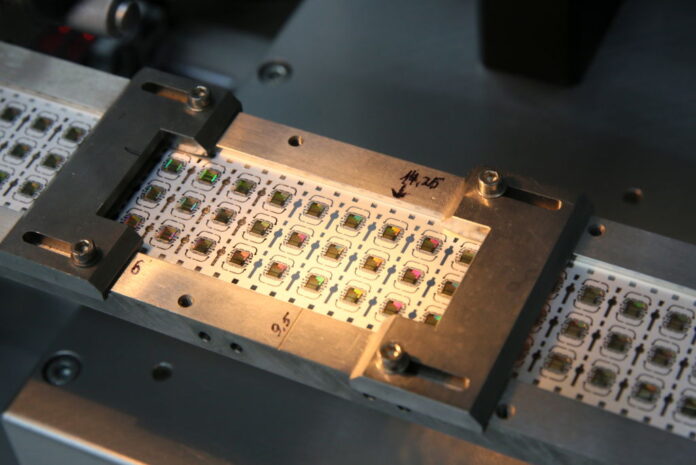Canada’s automotive sector and other industries gearing up for an end to the chip shortages of the past year might be waiting longer for relief as Russia’s invasion of Ukraine threatens key supply chains in semiconductor production.
Russia’s attacks this week on Ukraine — met with condemnation and harsh economic sanctions from western nations — have sent prices soaring on commodities such as oil and wheat, some of the major exports from the eastern European region now beset by war.
The countries are also a primary source of raw materials critical to the production of semiconductor chips, a critical electronic input that has faced global shortages for the past year tied to the COVID-19 pandemic and related shipping disruptions.
Russia-Ukraine conflict: Stock markets react to Russian invasion
Sarah Prevette, chair of Canada’s Semiconductor Council, tells Global News that exports of neon gas and palladium from Ukraine and Russia, respectively, are key to global development of chips.
“We’ve already seen prices start to jump,” Prevette says. “So the trickle-down effect of the war could potentially spike chip prices, which means that Canadians may end up paying more for their electronics or appliances, or not being able to get them at all.”
Semiconductors are no longer just the foundation of high-tech devices like phones or gaming consoles. Modern appliances like toasters and fridges, as well as cars, now have microchips baked into their systems.
Prevette says while there’s been some global recovery in the availability of chips, supply chains have not yet bounced back to their pre-pandemic strengths.
“I think we need to be prepared for some ongoing shortages to come forward with (the attacks on) Ukraine,” she says.
Among the sectors hit hardest by a shortage of semiconductors is the automotive industry, which is just ramping back up to speed after a week of disruptions earlier this month at the Ambassador Bridge.
Flavio Volpe, president of the Automotive Parts Manufacturers’ Association, says there’s been a “slow but steady” return of chip supply to the North American auto sector, but that the industry was banking on “substantial relief” to the flow of semiconductors starting in the second quarter of 2022.
Trending Stories
Ukraine orders full military mobilization to counter Russian invasion
Photos show aftermath of Ukraine invasion, troop buildups in Russia and Belarus
The surging costs of the materials that manufacturers can get a hold of — Volpe pegs spot prices for steel at three times higher today than a year ago — are also putting most automakers and their suppliers on “thin balance sheets,” he says.
A spokesperson from Canadian parts manufacturer Magna International told Global News Friday that its “focus is on securing business continuity” through the invasion in Ukraine.
“We are also working with our supply base to ensure stability during these very challenging circumstances,” they said in an emailed statement Friday.
The auto sector isn’t alone in supply chain pessimism.
The Canadian Chamber of Commerce released a business confidence survey Friday that shows 72 per cent of companies believe supply chain challenges have worsened in the past three months, and a further 91 per cent of businesses are expecting these problems to stay the same or worsen come spring.
Rising costs on inputs including labour, energy and raw materials are listed as the biggest obstacle for businesses in the months to come.
Sectors such as manufacturing are among the most likely to pass on those higher costs to consumers, according to the Chamber survey.
“The current experience with semiconductor shortage assures us that the price of vehicles will rise as well as every other consumer good,” Volpe says.
Volpe still expresses some optimism that supply chain issues will ease this year, and says he believes the auto industry can even mitigate a short-term disruption by sourcing materials outside the embattled eastern European region.
He warns, however, that further disruptions to other major players in the European auto sector could have a broader impact on semiconductor availability. Germany is a major global production hub for chips and is also heavily reliant on Russia for natural gas, he notes.
“The Russian army doesn’t have to knock on the German border to disrupt them. It’s already started,” he says.
Both Prevette and Volpe believe the political instability overseas should be a signal to the federal government of the need to invest in domestic production of semiconductors as demand only grows for the critical chips in the years to come.
Prevette says that Canada is “entirely dependent externally for semiconductors” but could have an opportunity to fulfill not just domestic needs, but global demand in the years ahead with the right manufacturing capability.
Demand for semiconductors in the auto industry will grow exponentially as governments increasingly mandate the phase-out of gas and diesel engines and push for electric vehicle adoption, Volpe says.
If Canada wants to remain a powerhouse in automotive manufacturing, it makes sense to shore up semiconductor supply chains at home, he argues.
“We’re all focused on the short-term crisis, but from a long-term perspective, governments are regulating increased demand in semiconductors. And I hope that they also partner with the private sector to build that capacity locally.”
— with files from Global’s Anne Gaviola
Russia-Ukraine Crisis: What comes next?
© 2022 Global News, a division of Corus Entertainment Inc.



